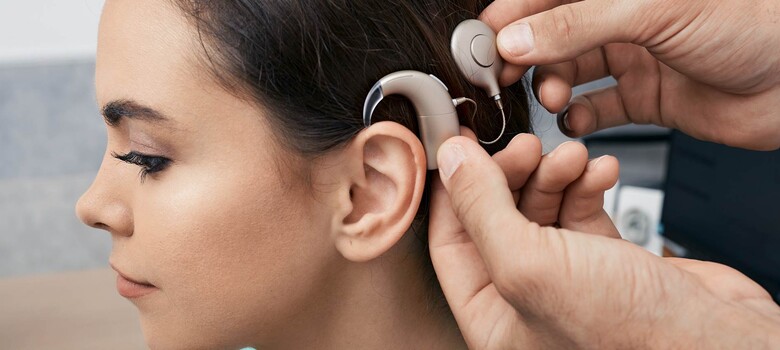Hearing Aids vs. Cochlear Implants
Which Hearing Loss Treatment Is Right for You?

Both hearing aids and cochlear implants help people with hearing loss to communicate better. Hearing aids do not require surgery and are best suited for people with less severe hearing loss and fair speech understanding. Cochlear implants require surgery and are best suited for people with more severe hearing loss in one or both ears and poor speech understanding.
According to Duke audiologist Erin Blackburn, a thorough evaluation will determine which option is best for you. Use this reference guide to compare hearing aids to cochlear implants.
| Hearing Aids | Cochlear Implants | |
| Radio Analogy | All you need is to fine-tune your radio station and turn up the volume. | Your radio receiver is damaged and sounds like static; turning up the volume will only make the static louder. You need a new radio. |
| Extent and Type of Hearing Loss | Hearing loss is mild to profound. Your type of hearing loss is either "conductive," meaning it stems from your outer or middle ear, or "sensorineural," meaning it stems from your inner ear or hearing nerve. |
Hearing loss is moderate to profound. Your type of hearing loss is called "sensorineural," meaning it stems from your inner ear or hearing nerve. |
| Speech Understanding | Excellent to fair/poor -- you are able to understand approximately 50% or more of spoken words during testing. | Fair to poor -- you are able to understand approximately 50% or less of spoken words during testing. |
| What the Devices Do and How They Do It |
Hearing aids amplify acoustic sound generally and/or by specific frequencies. | A cochlear implant device allows you to hear in a different way. This is called electrical stimulation. A surgically placed implant bypasses your inner ear. It translates acoustic sound into electrical signals. It sends the signals directly to the hearing nerve and then on to the brain. |
| Timing | Generally, it takes approximately two weeks or less for you to adapt to hearing aids. | Generally, it takes approximately 6 to 12+ months for you to adapt to a cochlear implant. |
| Surgery Required? | No. | Yes -- outpatient surgery under general anesthesia. |
| Risk | Little to none. | Low to moderate risk, because of the surgical aspect. |
| Age Limit | No upper age limit. | No upper age limit. |
| Insurance | Some insurance plans cover the cost. | Most insurance plans cover the majority or all of the cost. |
Learn More
Hearing Loss Evaluation and Treatments




